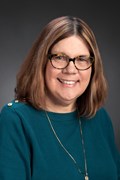In this course, students meet with residents face-to-face and hold class at Solarbron Retirement Community for most of the semester. Each student meets with one of the residents weekly in the first part of the class. After the hour-long visit, the students meet with the instructor for class discussion on their experience and review the course materials for that week. Students write weekly journals integrating their visits with material from the text for that week. This service learning project provides an opportunity for the older adult and student to engage in conversation and for the student to interview the resident and ask questions regarding his/her life. Each student writes a 500-word essay using the model “This I Believe” as a format with the resident. The essay focuses on an event/story that addresses the elder’s perspective on life. The instructor provides an outline and instructions for the assignment. At the final class visit, students meet as a group with all the residents participating in the service-learning project. Each student introduces his/her resident and reads aloud to the whole group his/her essay about the resident. Additionally, the student also writes 4-5 pages paper on his/her experiences at Solarbron, lessons learned from the visits and discussed how the experience influenced his/her perception of the elderly. The paper incorporates readings from the text as well as two outside research articles on the elderly from a professional social work related journal (magazine, newspaper, or book. When the class meets at the facility, students are to abide by the NASW Code of Ethics by adhering to confidentiality, treating staff, and the residents with respect. Students need to dress appropriately and behave in a professional manner. This service-learning component allows students to implement theory on aging into actual real life experience. The residences have opportunities to share their life experiences in addition to socialization with a younger generation.
Social Work 239 Service Learning Component
SOCW 239 Human Behavior in the Social Environment
During this semester, the class meet at St. Paul’s United Church of Christ and participate with their after school programs. This organization is located at 2227 W. Michigan Street, Evansville, IN. The phone number is 812-425-1522. The students work with Kim Armstrong, the Director of Youth Outreach Ministries. Students engage with children that participate in the After School Programs. These partnerships with the Youth Outreach Program provide students with experiences to interview children understand diversity and engage with families in their community. Students also learn about resources available to families in the community. These activities integrate the goals and objectives of the course in understanding culture, groups, community and human behavior from a biopsychosocial, spiritual perspective. When the class meets at St. Paul’s, students need to abide by the NASW Code of Ethics by adhering to confidentiality, treating staff, the students and parents with respect. Students must dress appropriately and behave in a professional manner. Students write a critical thinking/reflective paper after the last class that meet at St. Paul’s United Church of Christ. Students reflect on their activities, experience and new knowledge gained by integrating theories from the chapters discussed in class that demonstrate how theory in HBSE is related to practice, especially to family, community, and culturally diverse systems.
Social Work 323 Service Learning Component ( last year, Spring, 2015)
SOCW 323 Social Work Practice with the Elderly
In this course, students met weekly with a resident to interview and understand the importance of assessment of an elderly individual. Students met with an older adult at West River Health Campus, located at 714 S. Eickhoff Road. The phone number is 812-985-9878. The contact person is Kristen Beuligmann. The student developed an interview instrument incorporating the biological, psychological, social and spiritual aspects of aging from the readings in the text. Students also developed group activities as another way to engage with older adults and become aware of the needs of older adults in a residential facility. This course provides a framework for understanding not only the needs of the elderly, but also some intervention techniques used in meeting those needs. Residents and/or family granted permission for the interview.This is a quote from one of the students:
At West River, we had the opportunity to meet with a resident every Wednesday from 1:00 to 3:45 p.m.. Our main goal was to understand the bio-psychosocial and spiritual needs of elders that we were so blessed to meet. Whether it was playing cards, talking with them, or often just sitting in silence, we were able to gain a better appreciation for the elderly population and the struggles that they endure each day. Statistics show that by 2050, a large quantity of the world will be over 65. What does this mean? It is simple, it means that our generation of students is going to be crucial in the aging process, and understanding elderly persons and their needs is merely the first step. West River opened up many doors in our minds and hearts alike, in that, it allowed us to see our future. We are all going to grow old one day and West River is just one of many facilities that can give you an insight to the future. Elderly people are people. They were 18 at one point in their lives, with dreams, goals, and ambitions. They are often taken for granted, prejudged and misperceived. But if you take the time to sit and talk with them you may be surprised at the wisdom, and many words of encouragement they offer. As social workers and human beings in general, it is the responsibility of today's generation to be advocates for the elderly population, because one day we will want someone to advocate for us.


